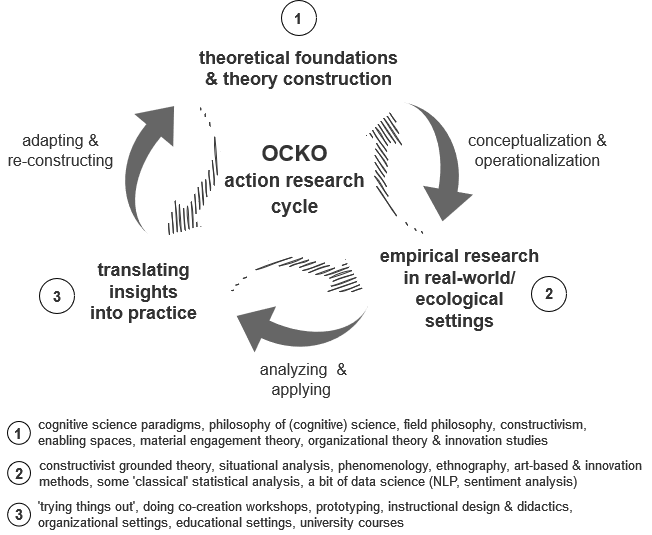How we work
Following the 4E (i.e., embodied, embedded, extended, enactive) and 4EA (& affective) approaches to cognition, we acknowledge that cognitive systems are not only embedded in and interact with their environment, but they organize, create, and make use of their (artifact and social) environment in such a way that it supports their social, learning, and knowledge (creation) processes.
We are interested in those environmental structures and constraints leading to the emergence of novel knowledge and innovations. These environmental constraints comprise various dimensions, such as social structures, cognitive and emotional processes, the body, epistemological processes, organizational and cultural structures, technology, and architecture.

Our research is based on theoretical and applied cognitive sciences, philosophy of science, social sciences, educational sciences, organizational theory, and innovation studies. We employ a wide range of approaches and methods (see image) on different levels of research, ranging from theoretical to applied research. Our main methodology is action research, strongly influenced by Grounded Theory methodologies. We emphasize interdisciplinarity and heterogeneity in our research teams and projects, as well as translational research.
OCKO research-teaching nexus
Our teaching activities in the fields of cognitive science (MEi:CogSci Master) and innovation (EC Innovation and Knowledge Creation) are both subject to our research and engage our students in research projects.
We strive to apply our knowledge and research insights not only in theoretical projects, but also concrete, practical contexts. Our research-teaching nexus allows us to do research on knowledge co-creation and innovation processes in "real-world", interdisciplinary teaching and learning settings, resulting in continuous adaptation (see above illustration) of our instructional and research designs.





